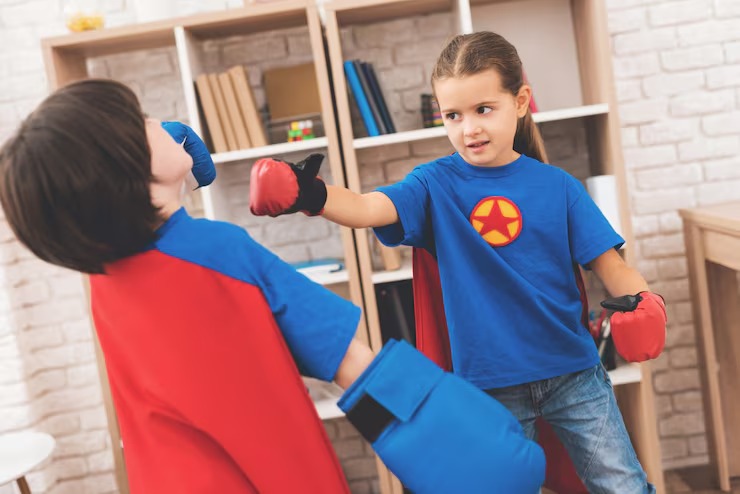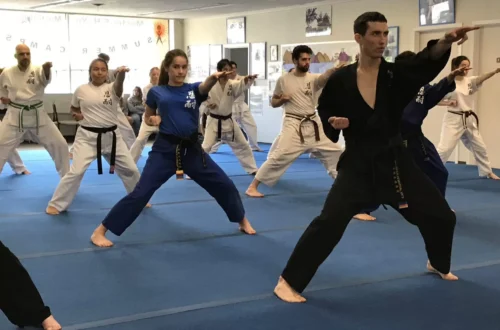Raising a child who feels confident and prepared to face challenges, whether in a physical activity like martial arts or a competitive event, is one of the most rewarding parts of parenting. Confidence isn’t something kids are born with—it’s built through intentional support, practice, and a nurturing environment. If your child is preparing for a fight, such as a martial arts match, a boxing bout, or even a metaphorical “fight” like a tough school presentation, you can play a pivotal role in helping them feel strong, capable, and ready. This article dives deep into practical, actionable strategies to boost your child’s confidence, grounded in real-world experience and expert insights, to ensure they step into any challenge with their head held high.
Why Confidence Matters for Your Child
Confidence is the foundation of resilience and success. When a child feels self-assured, they’re more likely to stay calm under pressure, make clear decisions, and bounce back from setbacks. For a fight, whether it’s a sparring match or a competitive event, confidence can mean the difference between freezing up and performing at their best.
The Science Behind Confidence
Self-confidence is rooted in self-efficacy, a psychological concept describing a person’s belief in their ability to succeed. Studies show that children with high self-efficacy are more likely to take on challenges and persist through difficulties. Building this belief starts with small, consistent actions that prove to your child they’re capable.
Confidence vs. Arrogance
Confidence is about believing in one’s abilities while staying grounded. Arrogance, on the other hand, involves overestimating skills and dismissing others. Teaching your child the difference ensures they approach a fight with respect for their opponent and trust in their preparation.
Preparing Your Child Mentally for a Fight
Mental preparation is just as critical as physical training. A child who feels mentally strong can handle the stress of competition without crumbling. Here’s how you can help them build that mental toughness.
Encourage Positive Self-Talk
Negative thoughts like “I’m going to lose” can creep in before a fight. Teach your child to replace these with positive affirmations like “I’ve trained hard, and I’m ready.” Practicing this daily builds a habit of self-encouragement that carries into high-pressure moments.
Practice Visualization Techniques
Visualization is a powerful tool used by elite athletes. Have your child close their eyes and imagine themselves performing well in the fight—landing a punch, dodging a move, or staying calm. This mental rehearsal builds familiarity and reduces anxiety.
Set Realistic Expectations
Help your child understand that winning isn’t everything. Focus on effort, improvement, and learning. By framing the fight as a chance to grow, you reduce the pressure to be perfect and allow them to approach it with a clear mind.
Create a Pre-Fight Routine
Routines provide comfort and structure. Work with your child to develop a simple pre-fight ritual, like listening to a favorite song, doing a specific warm-up, or repeating a mantra. This anchors them emotionally and signals their brain it’s time to focus.
Physical Preparation Builds Confidence
Physical readiness directly fuels mental confidence. When a child knows their body is prepared, they’re less likely to doubt themselves. Here’s how to ensure they’re physically ready for the fight.
Consistent Training and Practice
Regular training builds muscle memory and skill mastery. Enroll your child in a structured program, like martial arts classes, where they can practice consistently. The more they train, the more confident they’ll feel in their abilities.
Focus on Strengths
Every child has unique strengths—maybe it’s speed, agility, or endurance. Help them identify and lean into these strengths during training. Knowing what they’re good at gives them a confidence edge in a fight.
Simulate Fight Conditions
Recreate the fight environment during practice. If it’s a martial arts match, have them spar with different partners or practice in a ring. Familiarity with the setting reduces nerves on the big day.
Prioritize Rest and Recovery
Overtraining can lead to burnout or injury, which shakes confidence. Ensure your child gets enough sleep, eats nutritious meals, and takes rest days. A well-rested body feels strong and capable.
Emotional Support from Parents
Your role as a parent is critical in building your child’s confidence. Your words, actions, and presence can either lift them up or unintentionally add pressure. Here’s how to get it right.
Be Their Biggest Cheerleader
Show up to practices and matches with enthusiasm. Simple phrases like “I’m so proud of your hard work!” go a long way. Your child needs to know you believe in them, win or lose.
Avoid Over-Criticism
Pointing out every mistake can erode confidence. Instead of saying, “You didn’t block that punch,” try, “I noticed how fast you moved! Let’s work on blocking next.” Positive feedback keeps them motivated.
Share Personal Stories
If you’ve faced challenges yourself, share those stories. For example, I once froze during a public speaking event but practiced and nailed it the next time. Hearing how you overcame nerves makes your child feel less alone.
Create a Safe Space for Emotions
Fights can bring up fear or anxiety. Let your child know it’s okay to feel nervous. Encourage them to talk about their feelings, and validate them with responses like, “It’s normal to feel that way, and I know you’re going to do great.”
Building Confidence Through Community
A supportive community can amplify your child’s confidence. Surrounding them with positive influences creates a network of encouragement.
Choose the Right Coach or Mentor
A good coach not only teaches skills but also builds confidence. Look for someone who emphasizes effort, celebrates progress, and fosters a positive environment. A coach who yells or shames can do more harm than good.
Encourage Team Camaraderie
If your child is part of a team or class, help them connect with peers. Friendships built through shared training create a sense of belonging, which boosts confidence. Organize team meetups or encourage post-practice chats.
Involve Positive Role Models
Expose your child to inspiring figures, like athletes who embody resilience. Watching a martial arts champion’s journey or reading about their struggles can motivate your child to believe in themselves.
Practical Tools and Resources
Equipping your child with the right tools can make preparation feel tangible and empowering. Here are some resources to consider.
Best Tools for Building Confidence
- Meditation Apps: Apps like Headspace offer kid-friendly guided meditations to reduce anxiety.
- Training Gear: Invest in quality gear, like gloves or pads, to make your child feel professional.
- Journals: Encourage your child to write about their training progress and feelings.
- Inspirational Books: Books like The Young Champion’s Mind by Jim Afremow teach mental toughness.
Where to Find Support
- Local Martial Arts Dojos: Many offer confidence-building programs for kids.
- Online Communities: Forums like Reddit’s r/MartialArts provide tips and support.
- Counseling Services: A child psychologist can help with anxiety or self-doubt.
- Parenting Blogs: Sites like PositivePsychology.com offer science-backed strategies.
Comparison: Confidence-Building Activities
| Activity | Pros | Cons |
|---|---|---|
| Martial Arts Classes | Builds discipline, physical skills | Can be expensive, time-consuming |
| Visualization | Free, can be done anywhere | Requires consistency, mental focus |
| Positive Self-Talk | Boosts mindset, easy to practice | Takes time to become a habit |
| Team Sports | Encourages teamwork, social bonds | May not focus on individual confidence |
Addressing Common Challenges
Every child faces unique hurdles when preparing for a fight. Here’s how to tackle the most common ones.
Overcoming Fear of Failure
Fear of losing can paralyze a child. Remind them that every fighter loses at some point—it’s part of growth. Share stories of famous athletes, like Muhammad Ali, who faced setbacks but kept going.
Dealing with Performance Anxiety
Teach your child breathing techniques, like inhaling for four seconds and exhaling for six. This calms the nervous system. Practice these together before bed to make them second nature.
Handling Bullying or Intimidation
If your child feels intimidated by an opponent, role-play scenarios where they stand tall and assertive. Teach them phrases like, “I’m here to do my best,” to shift focus back to their effort.
People Also Ask (PAA)
Below are real questions from Google’s “People Also Ask” section, answered to address search intent.
How can I help my child feel more confident?
Encourage small wins, like mastering a new move, and celebrate them. Use positive reinforcement, practice visualization, and create a supportive environment. Consistency in these efforts builds lasting confidence.
What are some confidence-building activities for kids?
Activities like martial arts, theater, or team sports teach skills and resilience. Creative outlets like drawing or writing can also boost self-esteem. Choose activities that align with your child’s interests.
How do you prepare a child for competition?
Focus on mental and physical preparation. Practice routines, simulate competition settings, and emphasize effort over outcome. Provide emotional support to ease nerves and build excitement.
Why is my child afraid of fighting?
Fear often stems from the unknown or fear of failure. Address this by familiarizing them with the fight environment, practicing scenarios, and reinforcing that effort is what matters most.
FAQ Section
How long does it take to build confidence in a child?
Building confidence is gradual and depends on the child. With consistent practice, support, and small successes, you may see noticeable improvements in 3–6 months.
Can I help my child if I’m not confident myself?
Yes! Focus on learning together. Practice techniques like positive self-talk or visualization as a team. Your willingness to grow alongside them is inspiring.
Should I push my child to fight if they’re scared?
Never force participation. Instead, explore their fears, validate them, and gently encourage preparation. If they’re not ready, give them time and focus on building skills.
What if my child loses the fight?
Frame losing as a learning opportunity. Discuss what they did well and what they can improve. Celebrate their courage for stepping into the ring.
Are there professional resources for confidence-building?
Yes, child psychologists, sports coaches, or confidence-focused programs like Big Life Journal offer expert guidance. Local dojos or community centers may also have workshops.
Final Thoughts
Helping your child build confidence before a fight is about more than preparing for one event—it’s about equipping them with tools for life. By fostering mental toughness, ensuring physical readiness, and providing unwavering emotional support, you’re setting them up to face any challenge with courage. Start small, celebrate progress, and remind them that confidence comes from effort, not perfection. With your guidance, they’ll step into the ring—or any arena—feeling ready to shine.





